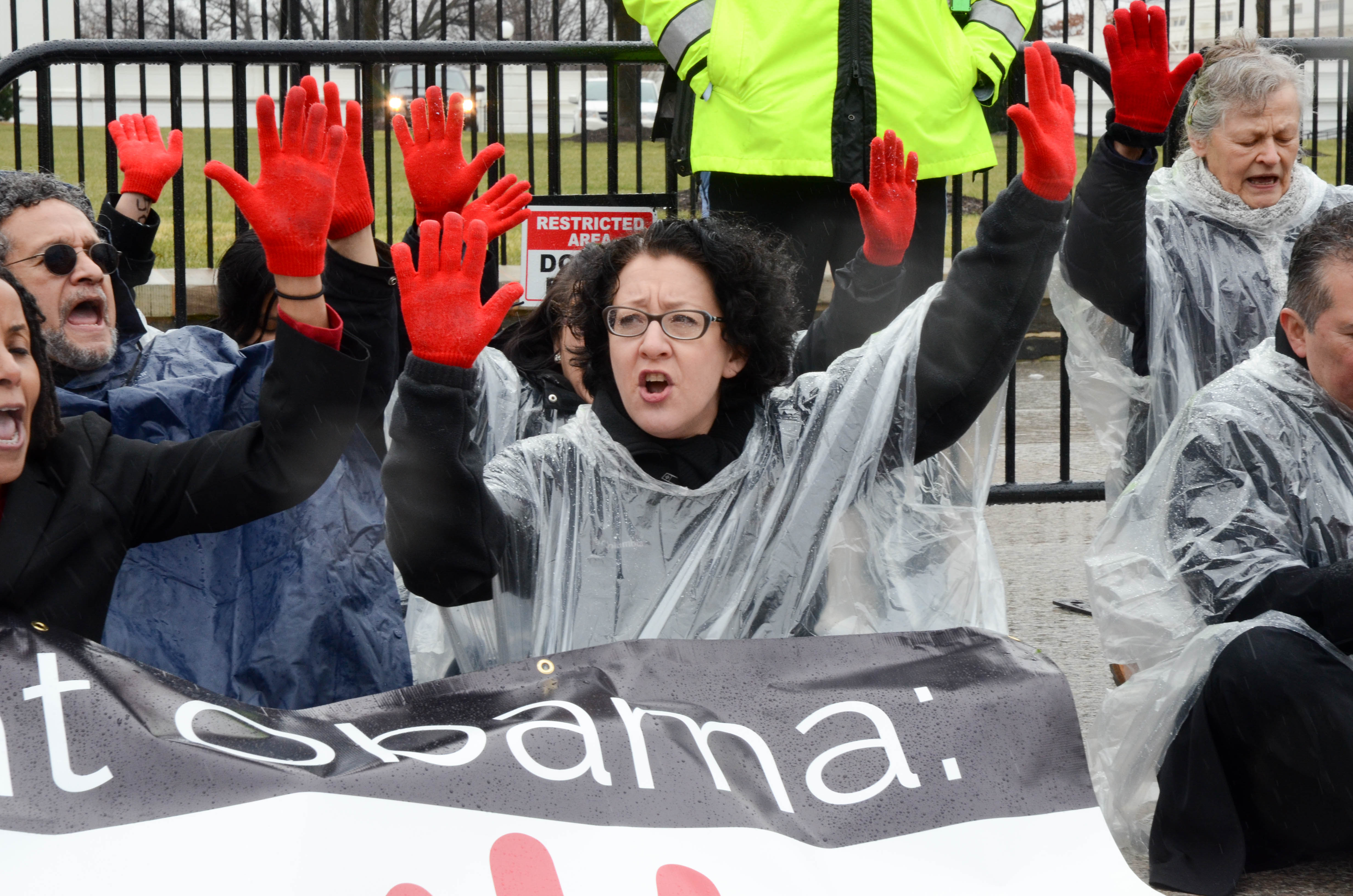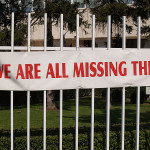by Sebastian Medina-Tayac, Camila Guiza-Chavez, Oscar Garcia-Ruiz, and Laura Plata
Rain slid down Alicia Camacho’s face as a police officer started to cuff her red-gloved hands Tuesday afternoon. Camacho, the associate master of Ezra Stiles College and a professor of Ethnicity, Race and Migration, wore the gloves to dramatize the message of the banner she had been holding in front of the White House, which read “President Obama: You Have Blood On Your Hands.”
Camacho sat on the sidewalk in front of the White House fence with 13 other immigration activists, many of whom came down from Connecticut the night before to protest the Obama administration’s recent escalation of deportations of Central American refugee families. After three warnings, District of Columbia Park Police arrested the activists.
Spearheaded by Fair Immigration Reform Movement and the Center for Community Change, the demonstration brought together a coalition of immigration reform groups to bring attention to the 83 Central American asylum seekers who died in their home countries over the past two years after they were deported by the Department of Homeland Security.
The other activists arrested include FIRM spokeswoman and prominent New Haven activist Kica Matos, Ana María Rivera-Forastieri of the Fair Haven-based group Junta for Progressive Action, and former Movimiento Estudiantil Chicano de Aztlan moderator Evelyn Núñez ’15. They held white crosses to honor the deportees killed in Central America and wore clear plastic ponchos to protect themselves from the rain.
“The action tomorrow is to say that the Obama administration is responsible for these horrific deaths … because of this deadly policy of returning people who have fled and asked for protection,” Camacho said in an interview Monday night in anticipation of the demonstration.
After the arrest in front of the White House, the activists were brought to a Park Police facility and were released upon posting the $50 bail, Núñez said. The 14 activists were also issued civil citations for blocking the passage. Camacho said before the protest that she expects to be back on campus by Wednesday.
Camacho’s arrest is a marker of the strength of the statewide and campuswide movement against the Immigration and Customs Enforcement raids to deport Central American refugees. Camacho and her fellow activists said they were moved by the experiences of undocumented people in their lives.
THE SCHOLAR-ACTIVIST
Camacho was raised in an activist family in Philadelphia that participated in the movement to stop U.S.-sponsored violence and genocide during various Central American civil wars in the 1980s. Her family and community took in refugees and supported them during the period of extreme instability. She grew up around the Salvadoran family they housed.
“It was an extraordinary group of people who risked everything … It impressed me beyond belief because they had suffered tremendous lives, lost family members and had their villages burned,” she said.
Camacho, whose research examines Latin American migration and policy, said she views the criminalization of migrants as both destructive and immoral. The 83 adults and children who were deported and then killed since early 2014 while petitioning for asylum are just a fraction of the casualties of draconian immigration laws, she said, for which the executive bears the ultimate responsibility.
Núñez said Camacho is willing to put what she studies and writes about into action, adding that it is inspiring to see such an accomplished professor stay attentive to these issues and believe in them so deeply.
Matos said Camacho’s position as a highly respected professor and a prominent activist in New Haven is unique and invaluable. Camacho had been on Junta for Progressive Action’s board for about 15 years.
Camacho said she feels “a profound connection to the struggles that [her] students are living,” including undocumented and Central American students who pass through her college and her classes. During her time at Yale, Camacho said she has witnessed the anguish of students in her classes who have had loved ones deported.
Camacho said she does not view her act of protest as part of any partisan political agenda, but rather as a sign of conscience and solidarity with her students.
Jose Rodriguez ’19 , one of Camacho’s students, said he was deeply moved by Camacho’s protest, noting it made him “proud to be an undocumented student here at Yale.”
FIGHTING THE FEAR
Tuesday’s protest came after months of mobilization from New Haven’s robust immigrant organizing network. In a demonstration on Jan. 6, Mayor Toni Harp and Police Chief Dean Esserman, among other city officials, joined 100 immigrants organized by Junta and Unidad Latina en Acción to make it clear that the city would not cooperating with immigration authorities conducting raids, affirming New Haven’s status as a “sanctuary city.”
This came just four days after the Department of Homeland Security under Secretary Jeh Johnson responded to the recent wave of Central American immigrants with a series of raids targeting 100,000 people, mostly mothers and children, according to Matos.
Johnson has stood behind the deportations, maintaining that the migrants who fled intensifying violence and poverty in Central America in 2014 have an opportunity in court to seek asylum. But advocates like Matos maintain that many deportees, including the 121 who have been sent back as a result of the raids, did not have their day in court. Congressmen and judges nationwide have attempted to contest the Department of Homeland Security’s mass detentions and deportations without due process, especially in the cases of unaccompanied minors and families, but with little success.
Eric Cruz, an organizer for the undocumented-student advocacy group Connecticut Students for a Dream, said the organizers of Tuesday’s protest met with representatives from Sen. Richard Blumenthal’s LAW ’73 office on Monday to discuss their planned civil disobedience and various campaigns for immigrant rights in the state. Both Blumenthal and Sen. Chris Murphy have been outspoken against the raids since they were announced last month, but Cruz said he wants to see more support from other elected officials in the state, such as from Gov. Dannel Malloy.
Many recent Central American migrants in Connecticut live in fear of being “hunted down” by Immigration and Customs Enforcement and sent back to dangerous environments, Cruz said. The students he works with in the Connecticut city of Willimantic, like him, are undocumented and already face barriers to education. The raids introduce a whole new level of fear among them, he said.
Unidad Latina en Acción, an immigration and labor activist group based on Howe Street, calculated that there are approximately 155 people in New Haven who fit the description of those currently targeted by ICE raids and expedited deportation processes.
While there have been no raids in New Haven thus far, Rivera-Forastieri said, “the damage has already been done.” In her role at Junta, she has dealt directly with residents who say they are afraid to send their kids to school for fear that they may be stopped by an enforcement agent and asked to show documentation.
Carmen, an undocumented Guatemalan resident of New Haven, is among those whose daily lives have been altered by the announcement and the recent raids.
“You never know when they’re going to come. We don’t go out of the house anymore unless we really have to,” she said. “We just go back and forth to work … There’s a lot of fear.”
On Monday, Alejandra Corona ’19, who is undocumented, participated in a data entry marathon for Yale Law School’s Asylum Seeker Advocacy Project. She said many immigrants are not notified by the government when they are expected to appear in court, so roughly 30 Yale volunteers worked for hours to make sure the undocumented migrants knew when to appear in court to fight their deportation. A report by the American Bar Association published in the summer of 2015 calls the current situation a “nationwide due process crisis in our country.”
photo courtesy of Michael Saldarriaga.
This article has been published in conjunction with the Yale Daily News.



